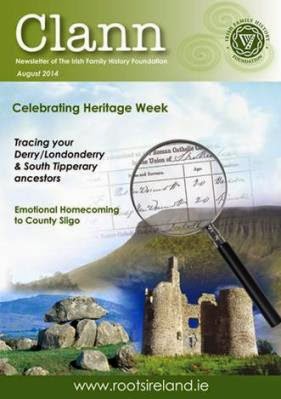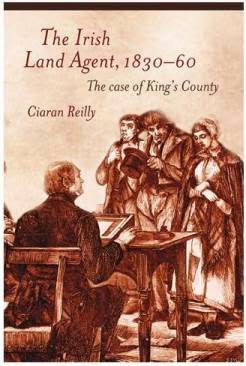With August just around the corner, we're about to enter a very busy events period, what with Heritage Week, the month-long Genealogy at Lunchtime talks at the National Library of Ireland and several lecture series commemorating the start of World War One. To help family historians plan and book ahead for what promises to be a stimulating few weeks, I'll be publishing a 14-day events listing every Monday.
Tuesday 29 July: World War One in County Wicklow, with John Goodman, looking at a number of Wicklow men and their frontline experiences, and how the war directly affected life in the county. Venue: Blessington Library, New Town Centre,
Blessington, Co Wicklow. 7pm. Free. Details: 045-891740
Tuesday 29 July to Friday 1 August: Spirit of Mother Jones Festival, Cork. Maldron Hotel and Firkin Crane Centre, Shandon,
Cork. Lectures, films, workshops, discussions, social events.
Details.
Friday 1 August: Preserving Your Family Papers, with Ketina Taylor, Archivist. Host: The National Archives at Fort Worth, Texas, USA. Venue: Montgomery Plaza location, 2600 West 7th Street, Suite 162,
Fort Worth, Texas 76107. From Noon to 1pm. Free but you need to book. Email: ftworth.education@nara.gov or tel: (817) 831-5620.
Friday 1 August: Digital sources, with Brian Donovan. Part of the Eneclann/Ancestor Network 20x20 lunchtime series. Venue: National Library of Ireland, Kildare Street,
Dublin 2. 20-min lecture plus Q&As. Free. No need to book. 1pm.
Sunday 3 August: Mayo Peace Park Ceremony & WW1 Commemoration. Local day of remembrance to honour the Irishmen and Irishwomen who died in past wars or on service with the United Nations. Memorial Peace Park,
Castlebar. 2:30pm.
Monday 4 August: Rediscovering the Belfast Nationalists who fought in World War One. Launch of exhibition with Siobhan Brennan Deane of the 6th Connaught Ranger Exhibition research group. Part of Féile an Phobail. All welcome. Venue: Falls Road Library, 49 Falls Road,
Belfast BT12 4PD. 1pm.
Monday 4 August: Remembering, forgetting and commemorating Ireland's Great War: Issues for Belfast, with Professor Richard S Grayson and PRONI. The lecture will draw closely on local stories of the war. Part of Féile an Phobail. All welcome. Venue: Falls Road Library, 49 Falls Road,
Belfast, Co Antrim BT12 4PD. 7pm.
Tuesday 5 August: The Soul of the Nation: Irish republicans, war and rebellion, with Fearghal McGarry and PRONI. The lecture will explore republican responses to the First World War, particularly how that wider conflict shaped the Easter Rising of 1916. Part of Féile an Phobail. All welcome. Venue: Falls Road Library, 49 Falls Road,
Belfast, Co Antrim BT12 4PD. 1pm.
Tuesday 5 August: Hatch Match and beyond…finding trails and tales in Parish records, with Rev. Patrick Comerford. Part of the Eneclann/Ancestor Network 20x20 lunchtime series. Venue: National Library of Ireland, Kildare Street,
Dublin 2. 20-min lecture plus Q&As. Free. No need to book. 1pm.
Tuesday 5 August: Religion, Society and Piety: the churches and people of early medieval Tipperary, with Patrick Gleeson. Cashel Summer Lecture Series. Venue: Cashel Library, Friar St,
Cashel, Co Tipperary. 7:30pm. Free.
Wednesday 6 August: The Great War and Unionist Memory, with Philip Orr and PRONI, who will seek to assess why the war continues to feature so much in popular Unionist culture. Part of Féile an Phobail. All welcome. Venue: Falls Road Library, 49 Falls Road,
Belfast BT12 4PD. 1pm.
Wednesday 6 August: Shipping records and their usefulness when searching for your ancestors, with Brian Mitchell MAPGI. Part of the Eneclann/Ancestor Network 20x20 lunchtime series. Venue: National Library of Ireland, Kildare Street,
Dublin 2. 20-min lecture plus Q&As. Free. No need to book. 1pm.
Wednesday 6 August: A Kilkee Man in the First World War, with Michael Nolan. Host: Kilkee Civic Trust Summer Talks 2014. Venue:
Kilkee Bay Hotel, Co Clare, at 8 pm. Admission free.
www.kilkeecivictrust.org
Thursday 7 August: Belfast Women and the Great War. Margaret Ward and Lynda Walker will be presenting a visual account of the impact of war in Belfast, looking at how women mobilised to support the war effort; the impact of war on work and social life and also on women's political organisations. PRONI will also give a short presentation. Part of Féile an Phobail. All welcome. Venue: Falls Road Library, 49 Falls Road,
Belfast, Co Antrim BT12 4PD. 1pm.
Thursday 7 August: The Great War Roadshow – songs and stories from WW1. Venue: Town Hall,
Cavan. 7:30pm. For details, phone Cavan Genealogy on (0)49 4361094.
Thursday 7 August: The Genealogy of Gaelic clans: sources records and evidence – 11th to 17th century, with Lorna Moloney. Part of the Eneclann/Ancestor Network 20x20 lunchtime series. Venue: National Library of Ireland, Kildare Street,
Dublin 2. 20-min lecture plus Q&As. Free. No need to book. 1pm.
Thursday 7 August:
The outbreak of the First World War, with Dr William Mulligan. Part of The Road to War Lecture Series. Hosted by PRONI and National Museums Northern Ireland. Venue: Ulster Museum Lecture Theatre, Botanic Gardens,
Belfast. 7pm. Free but booking essential. Email proni@dcalni.gov.uk or phone 44+ 028 905 34800.
Friday 8 August: Mothers and Midwifes: The experience of Childbirth and Midwifery in Ireland, 1630–1800, with Phil O’Loughlin. Host: Dingle Historical Society. Venue:
Dingle Library, Co Kerry. 7:30 pm
Friday 8 August: Yesterday’s Children: Discover your ancestor’s childhood, with Aoife O’Connor. Part of the Eneclann/Ancestor Network 20x20 lunchtime series. Venue: National Library of Ireland, Kildare Street,
Dublin 2. 20-min lecture plus Q&As. Free. No need to book. 1pm.
Friday 8 August: The formation and history of the three Irish Divisions, with Jimmy McDermott. The lecture will examine the politics that drove the formation of the three Irish Divisions. PRONI will also give a short presentation. Part of Féile an Phobail. All welcome. Venue: Falls Road Library, 49 Falls Road,
Belfast, Co Antrim BT12 4PD. 1pm.



















